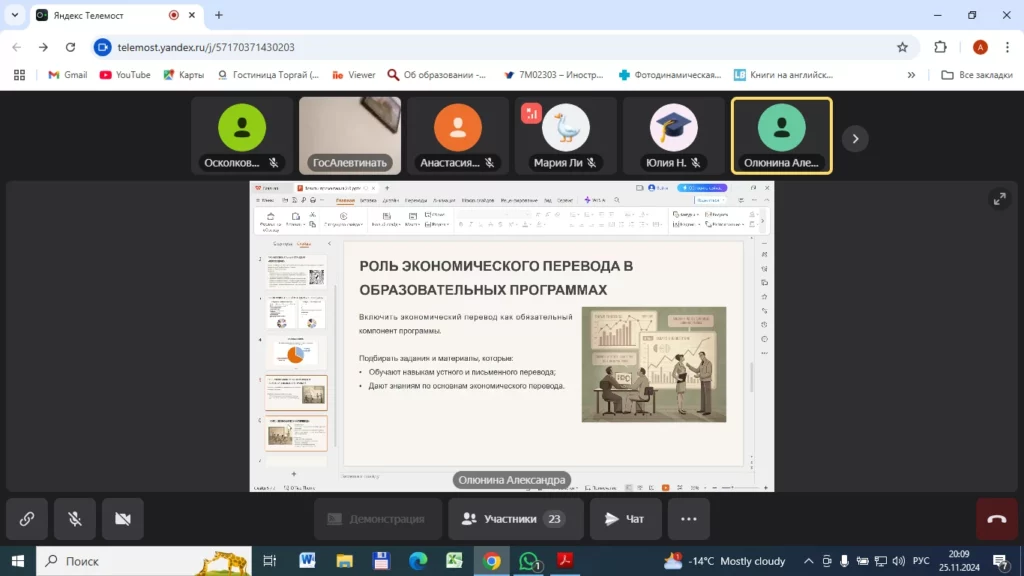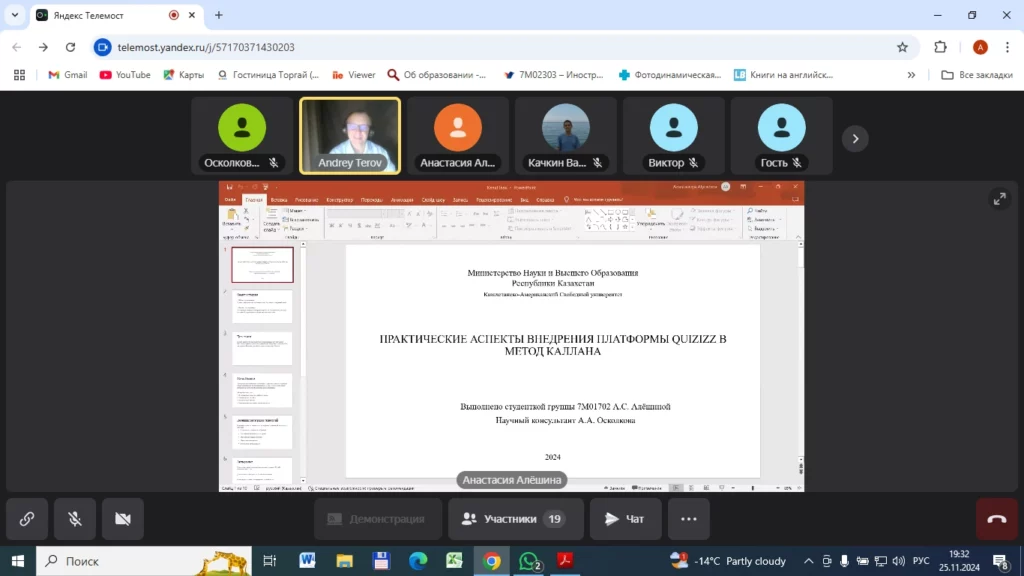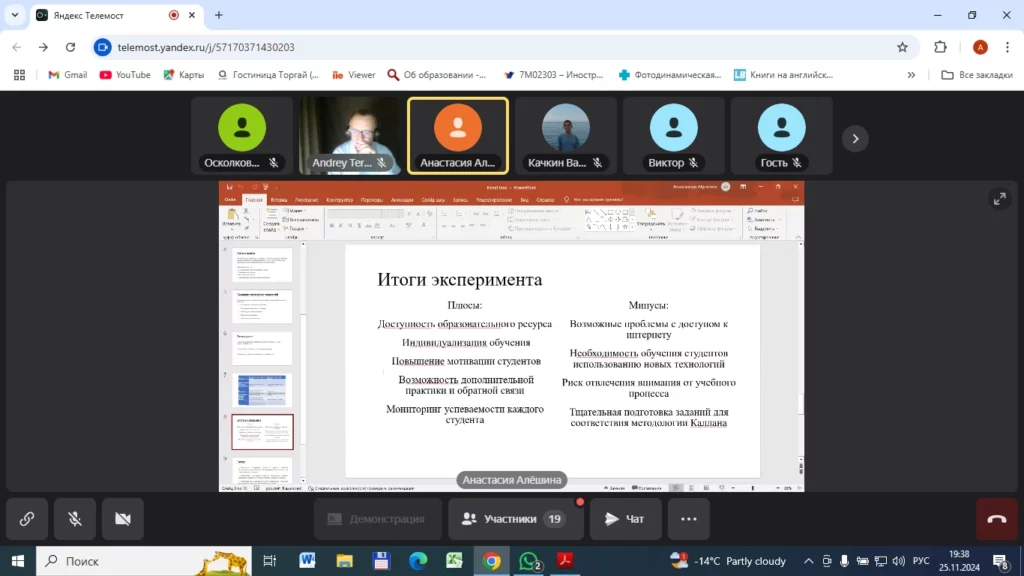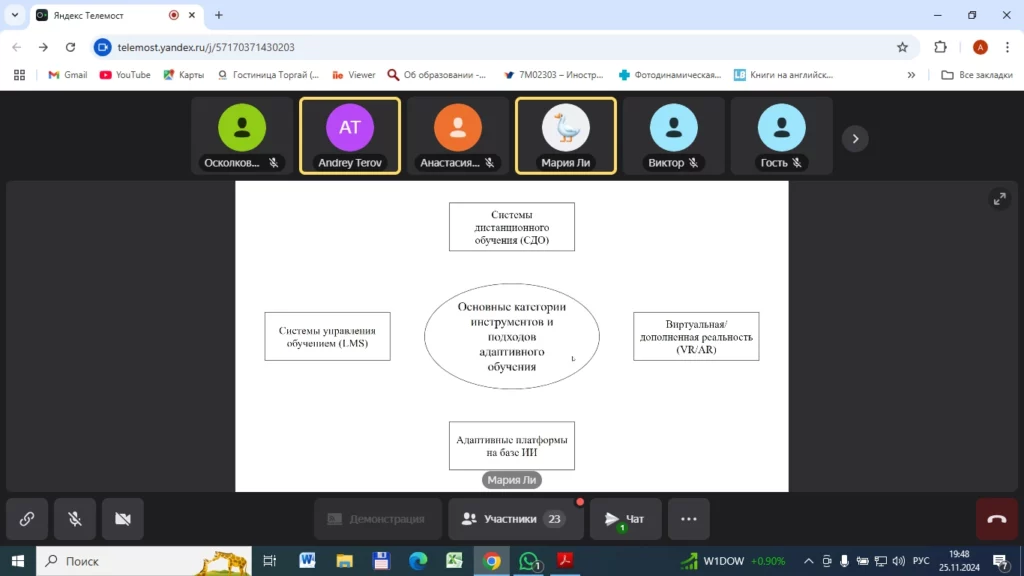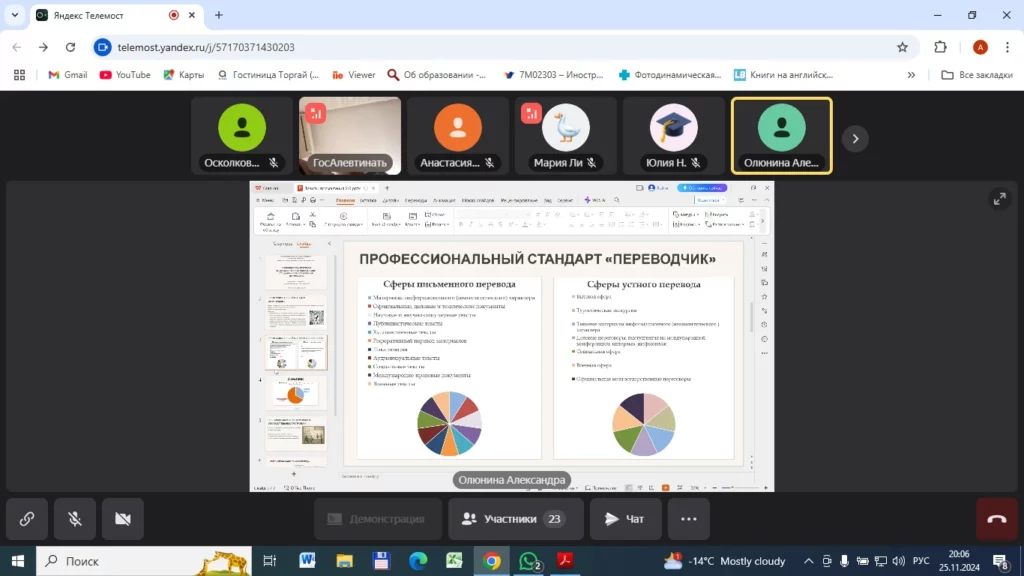Master’s Students of the Department of Foreign Languages of KAFU Presented Reports at the Conference of Moscow City Pedagogical University
On November 25, 2024, an open online conference of young scientists “League of Researchers” was held at Moscow City Pedagogical University (Russia, Moscow). Students and young researchers from different regions of Russia and neighboring countries took part in the event, discussing modern achievements in science and education.
13 master’s students of the EP 7M01702 “Foreign Language: Two Foreign Languages” of the Department of Foreign Languages presented their reports on current issues of applied linguistics and methods of teaching foreign languages.
Alexander Palkin in his presentation on the topic “Using template speech in mastering a foreign language” revealed the theoretical and practical significance of speech patterns, which are multi-word linguistic units stored in memory along with individual words. The classification of set expressions into phrases, template expressions and lexical blocks, their functions and examples are considered. The role of media as a language learning tool that promotes unconscious acquisition of phrases through films, TV series and video games is emphasized. The data of the analysis of unprepared speech of students are presented, revealing the frequency of using template speech and its impact on fluency. The presentation was concluded with proposals for integrating template speech into the educational process.
Nargiz Temerzhanova spoke on the topic “Development of tasks for reading and listening for current monitoring of knowledge of the English language at the Intermediate level”. This work is devoted to the study of methods for assessing the reading and listening skills of students with an intermediate level of English proficiency. In her work, Nargiz Temerzhanova considers the main types of assessment: formative, summative, diagnostic and current, as well as their use for monitoring and developing language skills. Analyzes their importance for determining the level of students’ preparation, identifying problem areas and providing ongoing feedback. Particular attention is paid to adapting assessment methods to the needs of intermediate students, including the use of authentic materials, gradually increasing the complexity of tasks, and integrating regular assessments.
In her presentation on “Digital Tools in the Implementation of Adaptive Learning Methods,” Maria Lee reflected modern approaches to the use of digital technologies in the implementation of an adaptive learning method for students of non-linguistic specialties. She highlighted the relevance of digitalization in the educational sphere, emphasizing its role in the formation of individual educational directions and the creation of hybrid learning formats that combine virtual and real components.
Attention was focused on the tools of the learning management system (LMS) and virtual laboratories, which provide opportunities to automate routine tasks, personalize learning, and analyze educational progress. The presentation provided examples of the successful use of Moodle, Labster platforms, as well as adaptive technologies using artificial intelligence, such as Smart Sparrow and ALEKS. In addition, Maria touched upon the benefits of digitalization, including increased student engagement, flexibility in choosing the pace of learning, increased access to educational resources, and the development of practical skills through virtual environments. Particular attention was paid to the introduction of digital tools, such as the need to improve the digital literacy of participants in the educational process and maintain live interaction during learning.
In her presentation on the topic “The Role of Current Assessment of Foreign Language Skills in Modern Education,” Eldana Sailaubekova spoke about the importance of current assessment to support the continuous learning process and adapt educational strategies. It was noted that, unlike traditional methods, current assessment focuses on monitoring student progress, providing timely feedback, and developing key skills. In her presentation, Eldana emphasized the importance of current assessment in lesson planning, task development, and progress monitoring, and outlined the main problems that teachers face and ways to solve them.
The article by Anastasia Aleshina is devoted to studying the impact of integrating the Quizizz interactive platform into the process of teaching English using the Callan method. During the study, an experiment was conducted with two groups of children, where it was found that the use of Quizizz helps to improve the effectiveness of learning, improve memorization of vocabulary and grammar, and increase student motivation. The article describes in detail the stages of the experiment, the results, and the conclusions drawn.
Master’s student Alexandra Olyunina presented the topic “Economic translation in Kazakhstan: from professional standard to educational programs”. This topic raises the importance of economic translation in the context of globalization and economic growth of Kazakhstan. The work showed the development of the course “Economic translation”, which combines the study of the basics of enterprise economics and translation skills. The course is focused on regional needs and includes topics related to financial planning, logistics, marketing and management. It was emphasized that economic translation should become a mandatory discipline that forms the key competencies of translators in demand in the labor market of Kazakhstan.
The reports of the master’s students received positive reviews. The speakers were able to answer all the questions of the online conference participants.
Department of Foreign Languages
